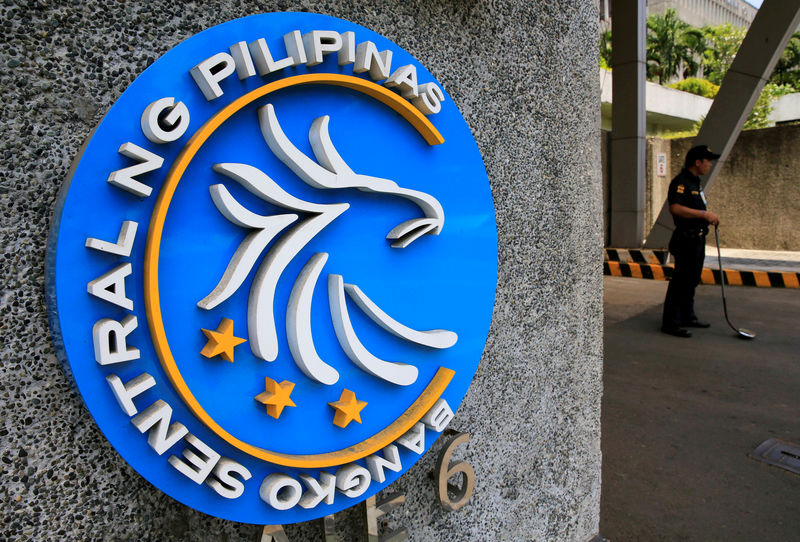 © Reuters. FILE PHOTO – Security guard stands beside a logo of the Bangko Sentral ng Pilipinas (Central Bank of the Philippines) posted at the main gate in Manila
© Reuters. FILE PHOTO – Security guard stands beside a logo of the Bangko Sentral ng Pilipinas (Central Bank of the Philippines) posted at the main gate in ManilaMANILA (Reuters) – There is room to ease monetary policy in the Philippines given a cooling in inflation, but the timing of any such action would depend on how the economy fares, the country’s newly-appointed central bank chief said on Friday.
Bangko Sentral ng Pilipinas Governor Benjamin Diokno also said that there is an opportunity to further reduce banks’ reserve requirement ratio, which he said is still too high.
“Given the deceleration in inflation, there is an opportunity for monetary easing but as I said that would depend on data,” Diokno told a news conference, his first since assuming office on Wednesday.
The central bank cut banks’ required reserves twice last year to 18 percent, to help bolster the slowing economy and in line with a medium term plan to bring it to single digit levels.
The annual inflation rate moved back inside the central bank’s 2-4 percent target in February when it eased to a one-year low of 3.8 percent, but year-to-date inflation of 4.1 percent is still outside that range.
Diokno, who is largely seen by the market as pro-growth, will chair his first policy meeting on March 21.
Until his appointment to fill a vacancy after Governor Nestor Espenilla died on Feb. 23, Diokno was President Rodrigo Duterte’s budget secretary. Diokno managed an expansionary budget aimed at delivering an ambitious $180 billion infrastructure revamp central to Duterte’s promises to create jobs and lift growth.
Diokno has been appointed to complete the remainder of Espenilla’s six-year term, which is due to end in 2023.
Before he was officially sworn into office, Diokno said on Wednesday he will study “expediting” a cut in the amount of cash that banks have to hold as reserves. He also said that inflation could fall to 2 percent, the bottom of the central bank’s target range – as early as the third quarter, due to base effects.
Diokno’s selection comes as the central bank is trying to strike a balance between supporting growth, which fell short of the government’s downwardly revised target last year, and defusing inflationary risks.
The Philippines is one of Asia’s fastest growing economies, but policymakers had to grapple with soaring inflation last year that pushed the central bank to raise its policy rate by a total 175 basis points to 4.75 percent.
Dionko, who served in the budget ministry under three Philippine presidents, said he will uphold the independence of the central bank.
Fusion Media or anyone involved with Fusion Media will not accept any liability for loss or damage as a result of reliance on the information including data, quotes, charts and buy/sell signals contained within this website. Please be fully informed regarding the risks and costs associated with trading the financial markets, it is one of the riskiest investment forms possible.
Source: Investing.com





























